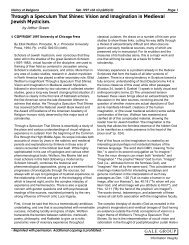here - University of Denver
here - University of Denver
here - University of Denver
You also want an ePaper? Increase the reach of your titles
YUMPU automatically turns print PDFs into web optimized ePapers that Google loves.
two interventions to decrease revictimization risk in adolescent teens, one <strong>of</strong> which focuses<br />
on gender socialization and the other which focuses on risk detection. The project involves<br />
collaboration with <strong>Denver</strong> Human Services to recruit teen girls in foster care. Role: PI.<br />
Trauma History and Symptoms among Women Exposed to Domestic Human Trafficking<br />
Colorado Campus Compact<br />
10/1/2011-6/30/2013<br />
$750<br />
This pilot study focuses on documenting domestic trafficking victims’ trauma histories and<br />
symptoms as well as service needs; this research will then be used to inform developing<br />
policy and practice in <strong>Denver</strong> in collaboration with our study partners at the <strong>Denver</strong> District<br />
Attorney’s Office and <strong>Denver</strong> Police Department. Role: PI.<br />
Deployment-focused development <strong>of</strong> depression treatment for victimized youth.<br />
National Institute <strong>of</strong> Mental Health (1 R34 MH080102-01A1)<br />
6/1/2008-5/31/2012<br />
Direct $447,840, Indirect $138,950<br />
This primary goal <strong>of</strong> this R34 application was to develop and conduct an initial evaluation <strong>of</strong><br />
a modified cognitive-behavioral treatment (m-CBT) for depressed adolescents with histories<br />
<strong>of</strong> interpersonal trauma. Treatment modifications are based on the hypothesis that standard<br />
CBT does not address two factors central to depression in trauma-exposed youth: 1.) deficits<br />
in executive function; and 2.) trauma-related cognitions. Because a history <strong>of</strong> interpersonal<br />
trauma is prevalent among depressed adolescents in community clinics, this project used a<br />
deployment-focused model <strong>of</strong> treatment development in order to create a “clinic-ready”<br />
intervention. Role: Co-PI with S. Shirk.<br />
Supplement to Deployment-focused development <strong>of</strong> depression treatment for victimized youth.<br />
National Institute <strong>of</strong> Mental Health<br />
Direct $147,497; Indirect $5,770<br />
The Effectiveness <strong>of</strong> Coordinated Outreach in Intimate Partner Violence Cases: A Randomized,<br />
Longitudinal Design<br />
National Institute <strong>of</strong> Justice (2007-WG-BX-0002)<br />
7/01/2007-3/1/2011<br />
$499,880 (Direct only: $361,957)<br />
This study tested the impact <strong>of</strong> a community-coordinated response program on criminal<br />
justice and well-being outcomes following intimate partner violence (IPV). In partnership<br />
with community- and criminal justice-based agencies, the project used a randomized control<br />
design to evaluate an innovative outreach program for IPV victims whose cases came to the<br />
attention <strong>of</strong> the criminal justice system. Results from this project inform program<br />
development, policy decisions, and extension <strong>of</strong> the program to other jurisdictions. Role: PI.<br />
Safe from the Start Program<br />
Office <strong>of</strong> Juvenile Justice and Delinquency Prevention, Department <strong>of</strong> Justice, 2010-2011<br />
Tony Grampsas Youth Services (TGYS) Program, 2005-2010<br />
Sexual Assault Prevention Fund, 2005-2009<br />
DePrince Vita November 2013, 26
















